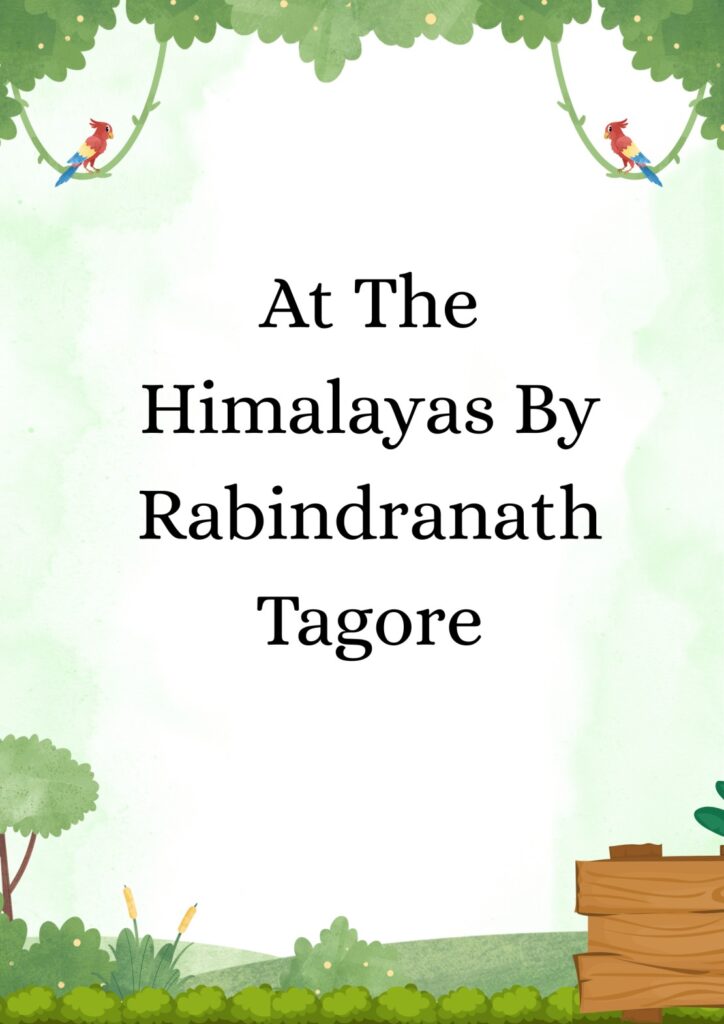Explore the insightful summary of At The Himalayas by Rabindranath Tagore, capturing the poet’s deep spiritual connection with nature and the majestic Himalayan landscape.
At The Himalayas By Rabindranath Tagore

BUY RABINDRANATH TAGORE FAMOUS BOOKS ON AMAZON
Summary of At The Himalayas By Rabindranath Tagore
Introduction
“At the Himalayas” is a poem written by Rabindranath Tagore, in which he highlights the invisible connection between the human soul and nature. In this poem, Thakur does not consider the Himalayas as just a chain of mountains, but portrays them as a mysterious, calm and meditative entity, which also contains infinite stories in its silence.
For the poet, the Himalayas are more than a temple or pilgrimage site — it is a place where man can calm the turmoil within him and understand himself. The tone of this poem is mysterious, but the expressions are extremely simple and lively.
Emotional Summary: Understanding the Soul of the Poem
1. Image of the Himalayas – Divinity residing in silence
At the beginning of the poem, the poet imagines the huge form of the Himalayas. For him, these mountains are like a great yogi, who has been silent, still for thousands of years, and yet is teaching a lot to the world.
He says that while the rest of the world is entangled in noise, the Himalayas stand deep in their silence. Its height, its snow-capped peaks, and its calm aura make it seem as if it is very close to God.
2. The Call of the Soul – The Search for Peace
Rabindranath Tagore opens the depths of his mind in this poem. He says that there is an echo within him – a voice that draws him towards the Himalayas. This voice is the search for solitude and spiritual peace away from the noise, busyness, and illusion of life.
The poet feels that all the answers of the world cannot be found in books or in debates – sometimes they are found only in silence, in the proximity of nature. And the Himalayas represent that silence.
3. Himalaya: The true Guru, the silent sage
The poet considers the Himalayas to be the true teacher. It does not preach or give any sermon, but its silence says everything. Its heights teach us to be humble, its stability teaches patience, and its silence inspires us to look within ourselves.
Thakur feels that the Himalayas are like a great sage, who, by separating himself from the world and concentrating, has found the inner light.
4. The pain of man being cut off from nature
There is also a pain hidden in the poem. The poet feels that today’s man has become very far away from nature. He has learned to live in cities, has learned to live with machines, but he has stopped understanding the language of nature.
The Himalayas are still the same – as calm, as steady, but now the number of people who see, feel, and understand it has reduced. This is the biggest pain of the poem.
Main messages from the poem
✅ 1. Importance of silence
This poem teaches us that sometimes the answers are not hidden in shouting, but in silence. Silence like the Himalayas connects us to our soul, where peace is the biggest answer.
✅ 2. Nature: Our true mother
The poem reminds us that nature is our first guru, our first refuge. When we move away from it, we also move away from ourselves. Returning to the lap of the Himalayas is returning to the lap of oneself.
✅ 3. Discovering oneself by separating from the crowd
Rabindranath Tagore shows us that even after getting everything in life, if the soul is empty, then that peace can be found in the heights of the Himalayas, in that deep silence.
Conclusion: Himalayas is not just a mountain, it is a philosophy of life
“At the Himalayas” is a very human and spiritual poem. It is not just a depiction of the beauty of nature, but it is a song of the silent dialogue between man and the universe.
Through the Himalayas, Thakur reminds us that until we learn to connect with nature, and with ourselves, our lives will remain incomplete. In this poem, the Himalayas become a place where no temple bells ring, but the soul awakens.
Summary in one line
The Himalayas are the silence that teaches the soul to speak.
Recommended Reading
Vocation By Rabindranath Tagore
Upagupta By Rabindranath Tagore
Freedom By Rabindranath Tagore
Where the Mind is Without Fear By Rabindranath Tagore